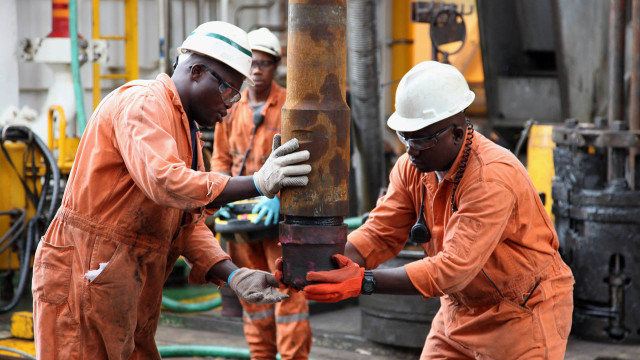Crude oil prices have dipped below $60 per barrel, causing worries about the ability of federal and state governments to finance the N75 trillion budgets planned for 2025 without incurring additional debt.
The decline in global oil prices coincides with Nigeria's struggle to raise production above 1.5 million barrels per day, which is significantly lower than the 2.06 million barrels per day target set in the fiscal plan for 2025. Actual production is around 1.4 million barrels daily due to ongoing issues with oil theft, pipeline damage, and lack of investment in upstream activities.
Both the federal government and the states are depending on enhanced oil revenues to support their ambitious budget plans, with the federal government aiming to spend N54.99 trillion this year, while the total state budgets exceed N25 trillion. Currently, Brent crude is priced close to $60 per barrel, and Morgan Stanley, along with other investment banks, has adjusted its oil price projections down to $62.5 per barrel.
This situation poses a significant challenge to Nigeria’s N43 trillion budget, which is based on an oil price benchmark of $75 per barrel and a production goal of 2.06 million barrels per day. Although Nigeria is relying on the increased local refining capacity from the Dangote Refinery and modular plants, analysts suggest that the current downturn will test the endurance of oil companies and their capacity to maintain dividends and share buybacks with tighter cash flow.
With crude prices falling short of budget expectations and a potential N19.6 trillion revenue shortfall looming, the country could encounter a soaring fiscal deficit of up to N30.79 trillion, much higher than the initially planned N13 trillion. RBC Capital Markets analyst Biraj Borkhataria remarked, “Given the uncertainty in the market, investors are seeking reassurance. The question now is which companies will be the first to make cuts.”
Analysts from Bank of America noted that investor confidence has been impacted by uncertainty regarding Saudi Arabia’s commitment to continue output cuts; however, they remain optimistic about companies with strong balance sheets like Shell, TotalEnergies, and Equinor.
“These companies are able to absorb the effects of lower oil prices without drastically impacting shareholder returns or long-term growth outlooks,” they stated. As of yesterday, Nigeria’s crude oil varieties, including Bonny Light, Forcados, and Qua Iboe, were trading around $60 per barrel, significantly below the budgetary benchmark.
Oil market analyst Kelvin Adegbite highlighted that Nigerian crude remains competitive, even with OPEC+ planning to ramp up output by 500,000 barrels per day starting October 2024. “Buyers are willing to pay a premium for Nigerian crude, particularly as global demand stays robust,” he commented.
The OPEC+ coalition, spearheaded by Saudi Arabia and Russia, is striving to balance market stability against increased supply amidst concerns about economic slowdowns in both China and Europe. Recently, Brent futures dropped by over one percent to $59.70 per barrel, reflecting investors' anxiety regarding OPEC+’s production strategies and ongoing global trade conflicts.
Meanwhile, major international oil corporations such as Shell, BP, ExxonMobil, and Chevron have reported lower first-quarter (Q1) earnings for 2025, citing declining crude prices, reduced refining margins, and increasing market volatility. As of yesterday, Brent crude prices hovered around $60 per barrel, with Morgan Stanley revising its oil price forecast down to $62.50 per barrel.
Shell reported a 27.9 percent decline in its Q1 adjusted earnings to $5.58 billion, compared to $7.74 billion in the same period last year, mainly due to lower energy prices and a $509 million charge related to the UK’s energy profits levy. Despite this, CEO Wael Sawan characterized the performance as “another solid set of results,” announcing a $3.5 billion share buyback plan over the next three months and reaffirming a capital expenditure target of $20–$22 billion for the year.
BP experienced a drastic 70 percent reduction in Q1 net profit to $687 million, down from $2.3 billion a year earlier, attributing the drop to decreased gas trading and falling refining margins, with revenue also declining by four percent to $48 billion. CEO Murray Auchincloss confirmed that the firm remains committed to maintaining operational flexibility amid market volatility.
Chevron’s Q1 profit fell 36 percent to $3.5 billion, down from $5.5 billion in Q1 2024, as production stagnated and revenues fell to $47.6 billion. ExxonMobil, the largest oil company in the U.S., reported Q1 profits of $7.7 billion, a decrease from $8.2 billion the previous year; however, earnings per share of $1.76 surpassed market expectations.
Globally, the oil sector faces pressure from rising supply levels, especially from the Organisation of the Petroleum Exporting Countries (OPEC), and regulatory uncertainties in the United States. Analysts caution that average oil prices in the latter half of 2025 could plunge more than 20 percent from the 2024 average price of $81 per barrel.




















